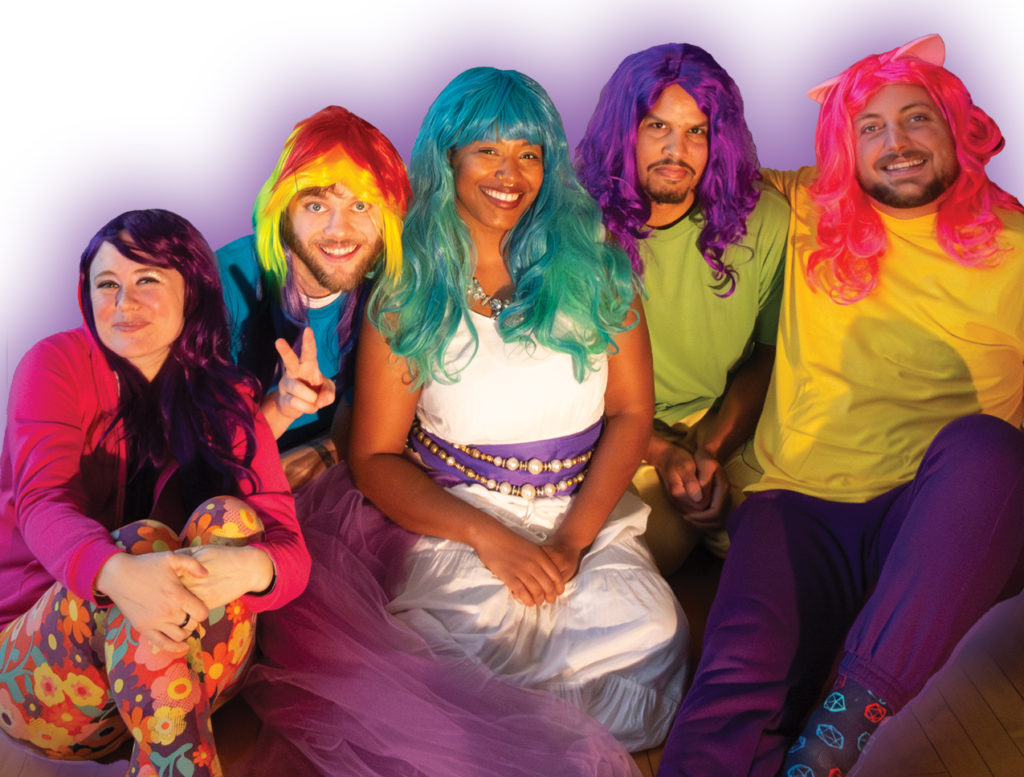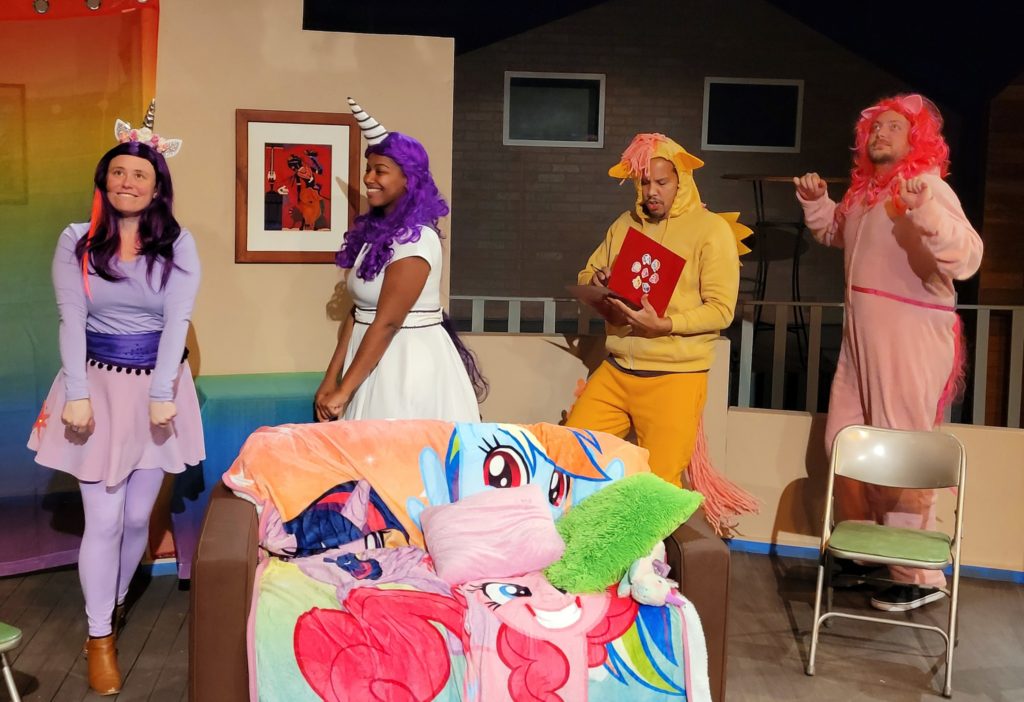
Photo by Danielle Jacques.
Presented by Apollinaire Theatre Company
By Eric John Meyer
Directed by Brooks Reeves
Stage Manager: Kaleb Perez
ASMs: Miguel Dominguez, William Benjamin
PA: Alexandra Gregory
Scenic & Sound Design: Joseph Lark-Riley
Costume Design: Elizabeth Rocha
Lighting Design: Danielle Fauteux Jacques
February 23-March 17, 2024
Chelsea Theatre Works
189 Winnisimmet Street
Chelsea, MA 02150
Directions
Runtime is approximately 120 minutes with one intermission.
Critique by Kitty Drexel
CHELSEA, Mass. — Playwright Meyer thoroughly researched the radicalization of marginalized internet communities to write his play. The Antelope Pary is an accurate depiction of the marginalized-person-to-political-extremist pipeline on a reduced schedule. He layers insidious nuances such as tolerance to intolerance and manipulation of social dynamics to reveal his characters’ layers of deception. Meyer shows us how insecure but privileged persons may inflict great violence when they take up the mantle of powerlessness in a world they feel has left them behind.
The Antelope Pary is also about Bronies. Theatre about My Little Pony: Friendship is Magic is easier to consume than another drama about the alt-right. Its message is the same: any community can be radicalized to extremist beliefs given the right conditions and environment. The argument and casual rejection that a community as fluffy as the Bronies could lead to violence is the point. Disbelief is a weapon.
A summary from the Apollinaire Theatre Company website:
“Equestria is a land of magic and friendship. Every Tuesday night, Ben hosts “The Rust Belt Ponies Meet-Up Group for Adult Fans of ” in his apartment in rural Pennsylvania. Sharing fun with these friends is a wonderful place to be. After all, nothing bad can happen in Equestria … But when an ominous neighborhood watch brigade starts patrolling the streets, fear and paranoia creep into the circle of friendship. The outside world is turning more violent and authoritarian, and it is sucking our heroes into an entirely different story.”
Director Reeves unfurls the silliness-to-severe trajectory of The Antelope Party with regulated normalcy. He and the cast show us what they want us to see and nothing more by weaving related sequences seamlessly. We know that danger is coming. Playwright Meyer tells us in the script. Reeves and the cast distract us with staging and emotional capitulation so, by the time danger has arrived, it is too late; the vulnerable characters can’t get away; the self-victimized antagonists are in power. There’s nothing we can do to stop them.
The dramaturgy of scenic and sound designer Joseph Lark-Riley and costume designer Ellizabeth Rocha complete the world-building within The Antelope Party. This play occurs in an apartment that must go from Brony paradise to an average domicile within seconds lest a bully request admittance. Its characters must put on and remove their Brony-wear at the same time. The lobby’s obvious Equestria map and off-center Antelope Party flag were nice touches.
Lark-Riley designed the set to reflect its characters’ fascinations and fears. Rocha clothed them the same way. These friends would use what they have without flaunting their intentions: rejected wigs gathered at Halloween, onesies and toys from Target, folders from a first day of school sale, and blankets from yard sales. They are small, undetectable trinkets that mean nothing to a stranger and everything to our characters.
There were uncomfortable giggles from the audience on Friday night. Despite the accurate show summary on Apollinaire’s website, the audience had to reconcile their preconceived biases against Bronies in real time. That sucks for the cast of The Antelope Party. It’s a consequence of fringe theatre shucking the status quo.
My recommendation to the cast is to lean even harder into their characters and world. Like Keytar Bear, dive so deep into your work that others accept it too. Make your choices bigger and your reactions stronger so the audience has no choice but to follow you down the mind-fuck rabbit hole. Stand tall; sit up straight; show us your teeth.
Evan Turissini as Shawn does this well. He goes HAM on his bronyhood and then harder as a lovesick party member.
Christa Brown makes a potent party sociopath as Maggie.
Alex Leondedis as Doug reminds us that affecting change requires a strategy that isn’t available to solitary plebes at the bottom.
Brit Garner as Rachel is the everywoman; she’s terrified, and she wants to believe people are better than they are.
Demetrius Fuller is cuddly and kind as Ben. Ben deserves better friends.
Danielle Fauteux Jacques has a strident voice that cuts through silence like a knife through butter. Her Jean may be a spy or she may be an earnest Pegasister. Her ambiguity makes the play believable.

Photo by Danielle Jacques. Friendship *is* magic!
The play just ends. There isn’t a dramatic lead-up to its final moments. We understood what the playwright was telling us, but we didn’t know how his characters felt about their circumstances. Or, if the actors in the final scene intended to build tension, it didn’t read.
The Antelope Party is strange and discusses difficult topics in silly ways, but that’s how radical extremists conducting psychological mimetic warfare over social media ensnare new recruits. The extremists use memes – offensive but comedic images and characters like Pepe the Frog– to declare hateful rhetoric and connect with followers. Not everyone is grabbed on the street and stuffed in a van.
If questioned, extremists can claim that those same hateful memes are merely artistic expressions; the questioner should chill out. In this way, with plausible deniability and America’s freedoms of speech that include hateful messaging, people are radicalized without recognizing their own participation and the world becomes more dangerous to anyone who dares not follow along.
Yes, The Antelope Party is strange, but extremist culture is strange. It’s a mirror held up to social trends. Perceived marginalization allows a person to do what they want because they believe they are already outsiders: Tradwives reject feminism while enjoying the benefits of feminism such as the choice to be tradwives; males’ dating coaches pitch their advice to broke #alphmales who can’t get a date. We love an underdog.
